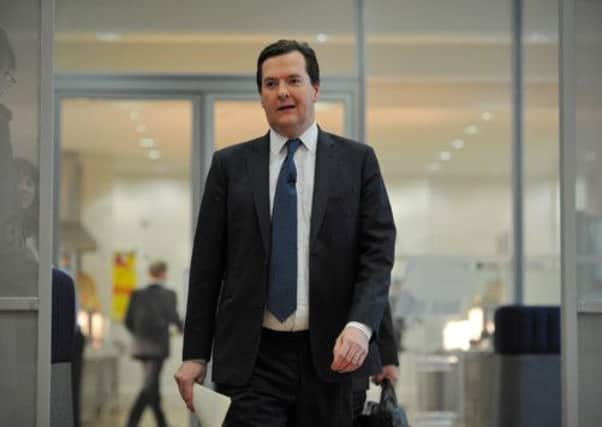IMF: ‘George Osborne should make economy changes’


Prospects for growth remain weak and the UK is “still a long way from a strong and sustainable recovery”, according to the IMF’s annual economic health check.
Assessors warned that after five years of relatively weak activity, “additional measures are needed to raise long-term expectations of potential growth”.
Advertisement
Hide AdAdvertisement
Hide AdSpeaking at the report’s launch at the Treasury, the IMF’s deputy managing director David Lipton said “what can be advanced should be advanced” in infrastructure spending.
Without investment, incomes will remain suppressed which “in turn will weigh upon consumption and investment and demand”, he said.
The Treasury should take advantage of the low interest rates it is currently paying on sovereign debt to fund the spending, he added.
“We suggest that government bring forward planned capital spending and consider measures such as reducing the marginal tax rate on investment and introducing tax allowances to raise equity.
“With sovereign yields at historic lows, the benefits from these measures in terms of economic growth would be
substantial.”
Mr Lipton called for the Bank of England to make clear it is going to keep interest rates low and for part-nationalised banks to be returned to private ownership “in a shape to resume lending activity”.
Signalling that the government should be ready to take a loss on the deal, he added: “If a sovereign backstop is required to meet a capital shortfall in that context, that should be provided, as it would have a high multiplier in terms of economic growth.”
Speaking at the launch, the Chancellor said he agreed with the IMF that “now is the time for a clear strategy on how to return RBS and Lloyds to the private sector in a way that protects value for the taxpayer”.
Advertisement
Hide AdAdvertisement
Hide Ad“I agree that it’s right to prioritise infrastructure investment where we can – that’s why we are investing more in capital than my predecessor had planned, that’s why I have added in the last few years to those plans and that’s why it will be a focus of the spending round next month.”
The IMF’s report comes after economists spent two weeks in London carrying out an in-depth assessment of Britain’s fortunes.
Shadow chancellor Ed Balls said the findings back Labour’s warnings that government plans are a drag on growth and risk doing long-term damage.
“They say, as we have, that you need to strike a balance between the pace of fiscal consolidation and support for growth and jobs,” he added.
“And it is clear that the government has not got that balance right. That is why the IMF is calling for urgent action to kick-start the economy, including bringing forward long-term infrastructure investment.
“With the IMF warning that the recovery is far from secure and the risks are to the downside, a sensible Chancellor would listen to the IMF’s advice and take action. Only a reckless Chancellor would try to plough on regardless.”
Graeme Leach, chief economist at the Institute of Directors, said: “When the IMF says that planned fiscal tightening will be a drag on growth, the discretionary measures amount to only £10 billion, which is pretty small. It would make more sense to argue to maintain the overall level of public spending, whilst shifting a greater proportion towards infrastructure, where the fiscal multipliers are stronger. In other words, spend the existing money better, rather than spend even more.”
The IMF said there were encouraging signs of some improvement in conditions, pointing to “notably strong” growth in private sector employment, but national output remained well below pre-crisis levels, “making this the weakest recovery in recent history”.
Advertisement
Hide AdAdvertisement
Hide AdConsolidation to tackle rising public debt was a “drag on growth” and a wider strategy was needed, it added.
The IMF backed monetary policy measures unveiled by the Chancellor in the March Budget and changes to the Funding for Lending Scheme aimed at boosting business growth.
It also said the government’s medium-term plans had earned it “credibility”. “Reducing the large structural deficit over the medium term is essential,” it stated.
But it also issued a warning over Help to Buy, the government’s flagship measure aimed at boosting growth, suggesting there was a risk it would ultimately lead to higher house prices.
TUC general-secretary Frances O’Grady said: “The IMF prognosis on the UK economy is damning – this is the weakest economic recovery in recent history. Our growth prospects remain poor and young people are paying the price.
“Worse still, much of this pain is self-inflicted. Capital investment – the best way to lift countries out of recession – is now at its lowest level since the Second World War.”